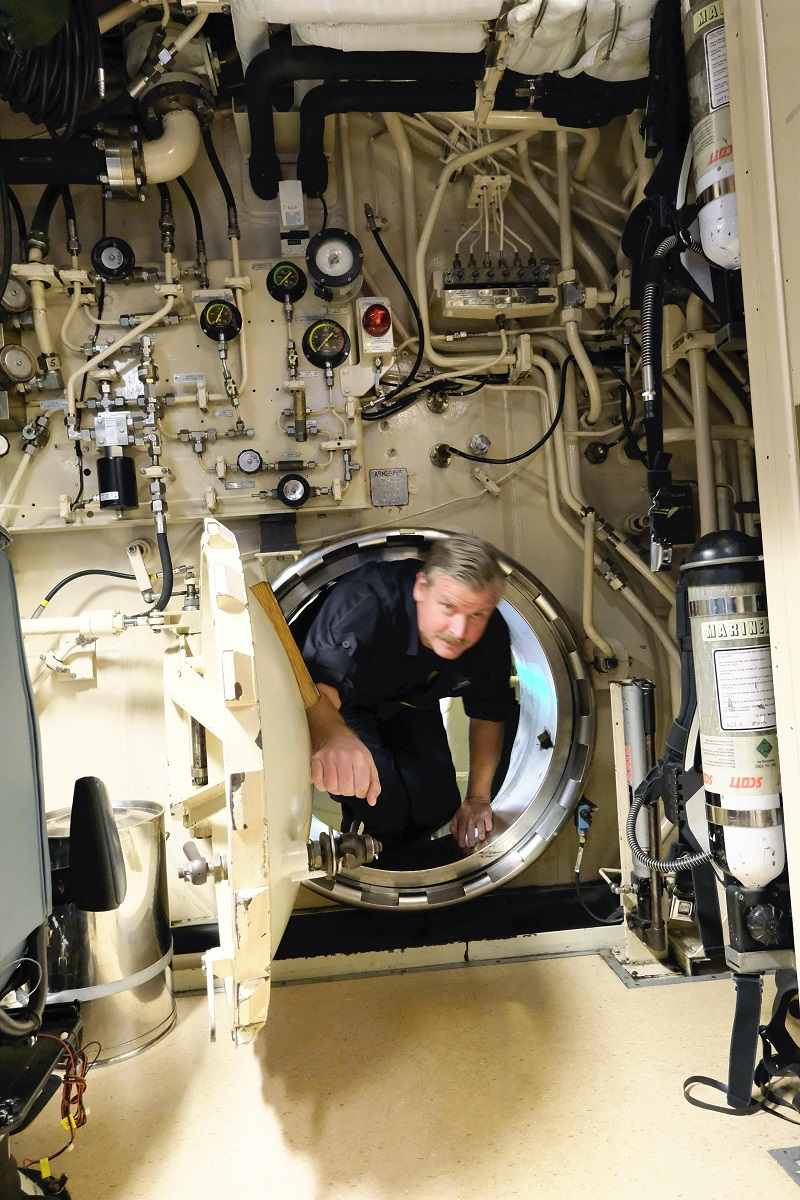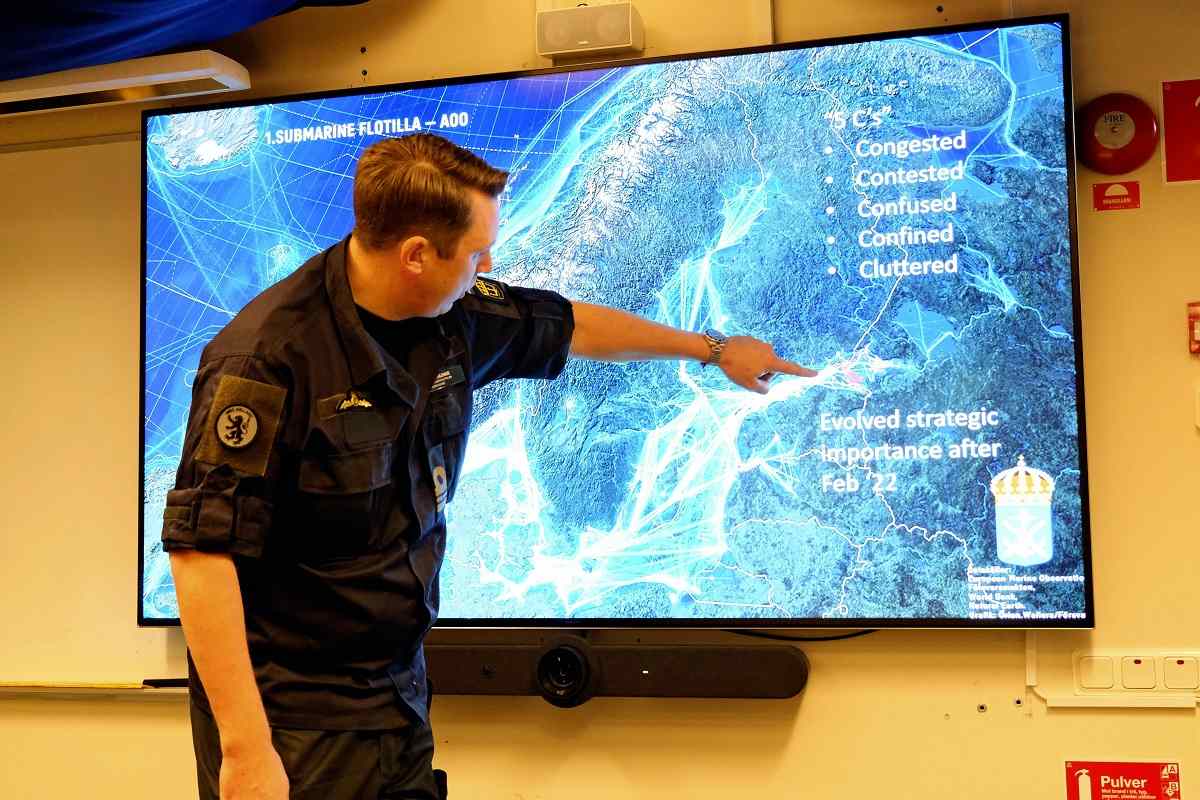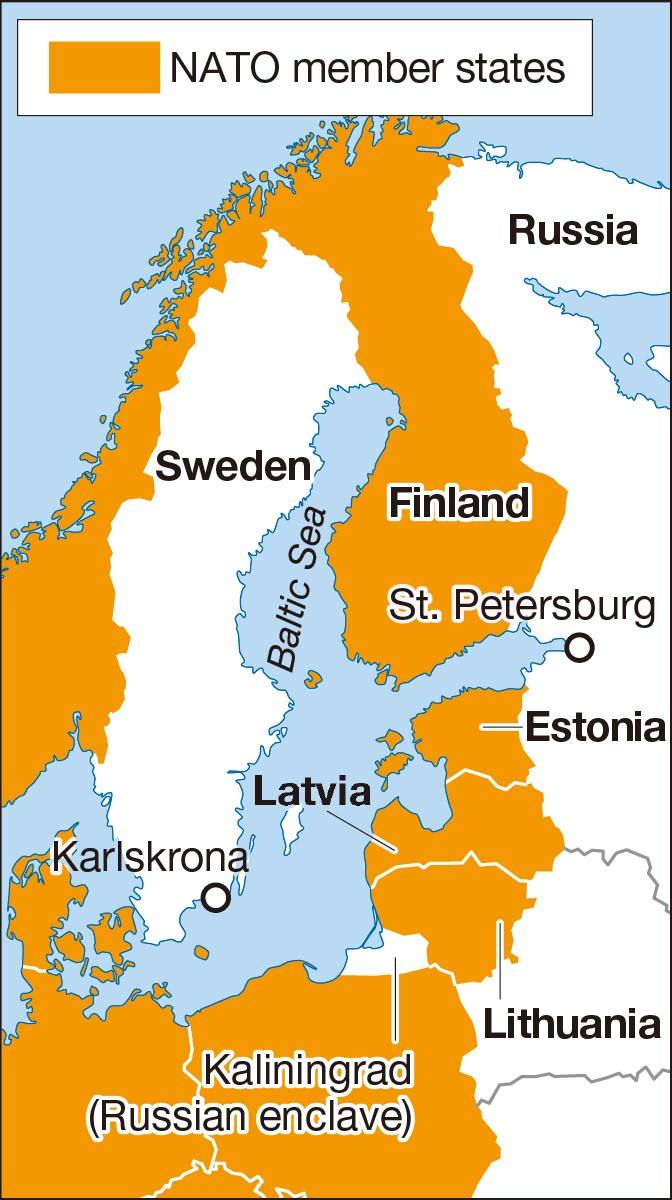
Inside of the Swedish Navy’s submarine Gotland
7:00 JST, January 30, 2024
KARLSKRONA, Sweden — European security will enter a new era when Sweden joins the North Atlantic Treaty Organization in a shift away from its 200-year-old non-alignment policy. NATO dominance is likely to be consolidated in the Baltic Sea, once referred to as a “Soviet sea” by the French newspaper Le Monde.
About 20 submarine models decorated a glass shelf at the entrance of the headquarters of the First Submarine Flotilla of the Swedish Navy in its home port of Karlskrona. The models were of every type of submarine operated by the Swedish Navy over the years.
“We have been here developing, building and operating submarines in the Baltic Sea for 120 years,” Commander Paula Wallenburg said with confidence. “I don’t think any other nation has that know-how.”

An officer points at a map of the Baltic Sea at the Swedish Navy’s First Submarine Flotilla headquarters.
The Baltic Sea is dangerous for submarines. The water is shallow with an average depth of 54 meters, and waters close to the coastline are littered with countless mines that were placed during World War I and II. Another characteristic of the Baltic Sea is that the salinity varies greatly from place to place. This affects the buoyancy of submarines, reportedly making them difficult to maneuver.
The Swedish submarine fleet has accumulated experience and data in these adverse conditions. After joining NATO, it will make use of these assets and play a role as part of the NATO forces in scouting and monitoring the movements of the Russian Navy’s Baltic Fleet.
“I don’t think relations with Russia will normalize anytime soon,” said Lt Cdr Carl Gyhlenius, the flotilla’s chief of plans. “We are going to have to keep a high amount of vigilance on the Baltic Sea, which is our way of contributing to NATO.”

With Sweden’s membership, NATO forces will be able to incorporate the entire Nordic region and the Baltic Sea into its defense plans. Particularly benefiting will be the three former Soviet Union’s Baltic states of Estonia, Latvia and Lithuania. Activities of the Russian Baltic Fleet, based in the Russian enclave of Kaliningrad that borders Lithuania, would be hampered.
In the event of an emergency, Swedish submarines are expected to lurk in the waters off the Baltic states to prevent Russian warships from approaching.
From the Russian perspective, this would dramatically increase the difficulty of a military invasion of the Baltic states. If Russia is discouraged from invading them as a result, NATO will be right on target.
Wallenburg stressed the significance of Sweden joining NATO, saying: “You just know if there is a submarine somewhere, it will create a headache for the opponent. And the deterrence will increase because it’s a NATO submarine that you have against you. Sweden will be safer with NATO, and NATO will be safer with Sweden.”
"World" POPULAR ARTICLE
-

8 Japanese Nationals Stranded on Indonesia’s Sumatra Island
-

Mozambican Cooking Class Held in Matsuyama, Ehime Pref.; Participants Don Aprons, Bandanas Made from Traditional Mozambique Fabric
-

China to Impose Sanctions on Shigeru Iwasaki, Former Head of Japan’s Self-Defense Forces, Who Serves as Adviser to Taiwan’s Executive Branch
-

U.S. Senate Resolution Backs Japan, Condemns China’s Pressure
-

South Korea’s Top Court Dismisses Nippon Steel Appeal in Lawsuit over Requisitioned Worker
JN ACCESS RANKING
-

Keidanren Chairman Yoshinobu Tsutsui Visits Kashiwazaki-Kariwa Nuclear Power Plant; Inspects New Emergency Safety System
-

Tokyo Economic Security Forum to Hold Inaugural Meeting Amid Tense Global Environment
-

Imports of Rare Earths from China Facing Delays, May Be Caused by Deterioration of Japan-China Relations
-

University of Tokyo Professor Discusses Japanese Economic Security in Interview Ahead of Forum
-

Japan Pulls out of Vietnam Nuclear Project, Complicating Hanoi’s Power Plans
























